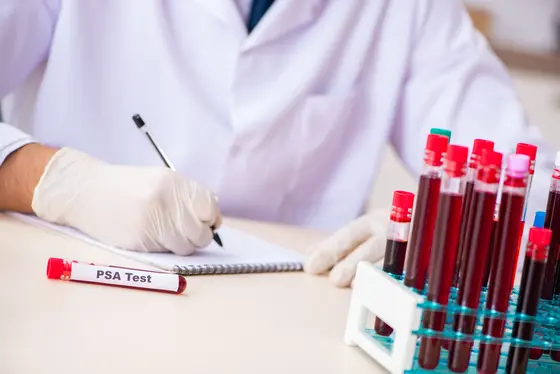Risk-adjusted screening strategies for prostate cancer should help to ensure that fewer men are tested unnecessarily often. According to the experts, this can reduce over-diagnosis and over-treatment, which can cause more harm than good.
To this end, PROBASE, a population-based, randomized prostate cancer screening study, was designed to investigate the effectiveness of risk-adjusted PSA screening starting at either 45 or 50 years of age. PROBASE is being conducted at the university hospitals in Düsseldorf, Hanover, Munich (TU) and Heidelberg, coordinated by the German Cancer Research Center (DKFZ) and funded by German Cancer Aid.
In one half of the study participants, PROBASE study arm A, the PSA value was determined immediately upon recruitment. Based on this PSA baseline test, the participants were divided into groups with low (<1.5 ng/ml blood), medium (1.5 to 2.99 ng/ml) or high (≥3 ng/ml) risk.
Participants classified in the high-risk group were recommended a prostate biopsy under MRI control for further diagnostics. For men whose baseline PSA values were in the low or medium range, repeat PSA tests were scheduled every five or two years.
Of the more than 20,000 participants who were initially classified in the low-risk group, 14,248 have now undergone the second PSA test at the age of 50. A team around first author Agne Krilaviciute has now calculated that only 0.45 percent of these men (64 participants) had high PSA levels (over 3 ng/ml) and were referred for MRI and biopsy. And only 9 of the 14,248 men were diagnosed with prostate cancer after five years - this corresponds to 0.06 percent of the initial group.
The guideline of the European Association of Urology (EAU) recommends a risk-adjusted screening strategy for men based on a baseline PSA value. Men with a PSA value of over 1 ng/ml are currently classified as being at risk. They are recommended to undergo a follow-up examination every two years.
The baseline PSA value of 71 percent of PROBASE participants is below the limit of1 ng/ml. In contrast, 89 percent of the study participants fall below the limit of1.5 ng/ml. PROBASE study leader Peter Albers, Head of Division at the DKFZ and Director of the Department of Urology at Düsseldorf University Hospital, explains: “If we raise the low-risk limit from 1 ng/ml to 1.5 ng/ml, we could give 20 percent more men in our study group a longer interval between tests. Very few develop prostate cancer during this time. A significant proportion of the almost 14 million men aged between 45 and 50 in Europe would benefit from such a change.“
Albers also points out: “PROBASE is not yet complete. We may find that an even longer screening interval than the five years is possible without additional risk.“
* PROBASE: “Risk-adapted prostate cancer early detection study based on a “baseline“ PSA value in young men – a prospective multicenter randomized trial“
Agne Krilaviciute, Rudolf Kaaks, Petra Seibold, Maxime de Vrieze, Jale Lakes, Jan Philipp Radtke, Markus Kuczyk, Nina N. Harke, Jürgen Debus, Christoph A. Fink, Kathleen Herkommer, Jürgen E. Gschwend, Valentin H. Meissner, Axel Benner, Glen Kristiansen, Boris Hadaschik, Christian Arsov, Lars Schimmöller, Gerald Antoch, Frederik L. Giesel, Marcus Makowski, Frank Wacker, Heinz-Peter Schlemmer, Nikolaus Becker, Peter Albers: Risk-adjusted Screening for Prostate Cancer – Defining the Low-Risk Group by data from the PROBASE trial
European Urology 2024, doi.org/10.1016/j.eururo.2024.04.030



